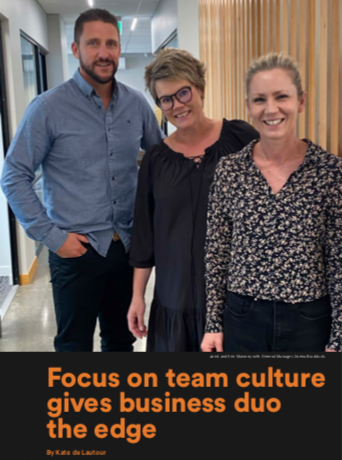When Erin Maloney was six months pregnant, husband Jared announced he was leaving his job in the meat industry and launching a start-up. Catalyst Fuel Refunds was born soon after, as was son Jack.
The business captured a niche market, with staff and customer numbers growing fast. Being new to business ownership, Jared looked around for options to develop his management skills.
He joined The Icehouse Owner Operator Programme and eight years later, the Catalyst team is still heavily involved with The Icehouse, alongside the couple’s second start-up business Tiny Nation, commercial property interests and a separate entity offering shared services across all businesses.
Anyone operating off-road petrol machinery should know about the opportunities to recoup excise tax for their vehicles. The offering applies mainly to farming and forestry businesses but anyone fitting the criteria can apply. Catalyst makes it a simple process with their bespoke software that integrates with fuel companies and NZTA.
When the business was first born, there were no other agents in the industry with their own software helping business owners to claim refunds so, not surprisingly, Catalyst took off. Jared joined The Icehouse with a view to developing his leadership skills to support him in creating the best team culture as staff numbers grew.
“For me it was about building my skills in finance and administrative processes but also I was managing a wide range of people. We were focused on building the team to get them through the growing pains of being a start-up and we have learnt a lot. Back then, we were working off the smell of an oily rag and we had some challenges but now, we have grown an amazing team.”
Erin was able to join the one-on-one coaching sessions as part of The Icehouse programme. She was fully involved in the strategic development of the business and her focus was always on the people.
“We were starting a family at the same time and so were increasingly aware of the pressure of juggling the work/life balance. It’s been really important for us to look at how to engage people – still with the high levels of accountability – but also inspire them to want to be here and do the mahi as well as having the time they need to spend with their families.”
In 2019 the couple decided to implement a four-day working week for the team. Staff work four days to be gifted the fifth. Jared adds that while the results are great, it’s more rewarding to hear about the extra things people can do for their families on that day off, “like grandparents taking their grandchildren to swimming lessons”.
“We’ve seen a 10 percent improvement in productivity in 20 percent less hours, and an 81 percent reduction in absenteeism, but for us it’s more about the recognition that everyone has a life outside of work.”
General manager Donna Braddock says the four-day working week has seen loyalty to the business grow significantly. “It takes time to recruit and develop a new team member – we want them to stay.”
Donna has also had a dose of The Icehouse, enrolling in the Effective Leadership Programme post Covid-19 lockdown. In the last year Erin has been able to switch her time focus to her new start-up childcare business, Tiny Nation.
“It’s been pretty seamless and from a set-up point of view, having the systems and processes embedded with Catalyst over the years gave me the launchpad for Tiny Nation. While we needed specific early childhood education skills, a lot of the general business functions we already had in-house and were able to share.
“We have team members in Catalyst who have been with us since near the start and they are looking for the next opportunity, so diversifying our business platforms provides points of interest for them that allow us to retain and grow our people across the board.
From my point of view, Tiny Nation wouldn’t have been able to scale nationally as quickly as we have without the shared services resource.”
Erin says having the access to shared resources that a start-up wouldn’t normally be able to afford has planted the seed as to how the shared services entity could help other small start-up businesses.
“That’s a major strength of the whole organisation in that we are always asking, how can we do things better? It’s about working smarter, not harder.”



